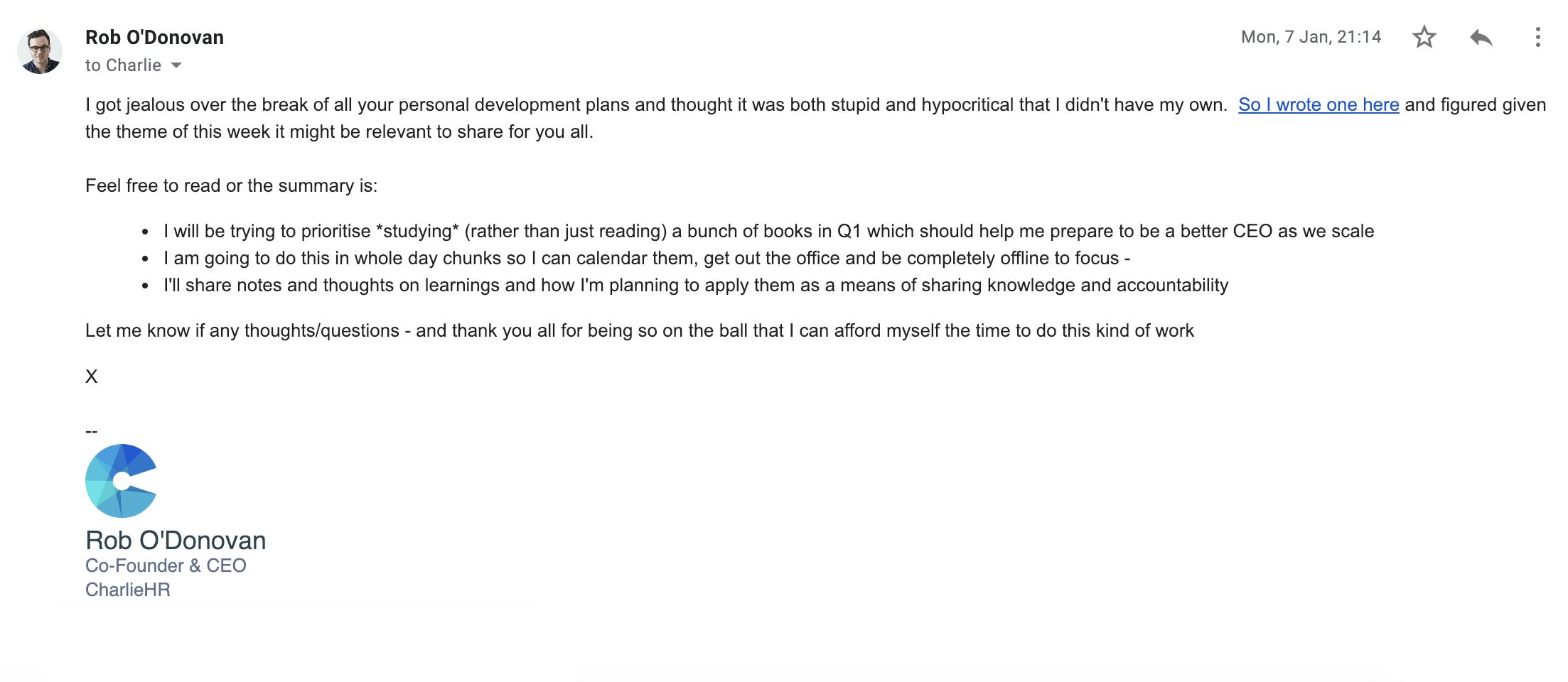How can a CEO invest in their own personal development?

Every CEO understands the benefits of developing their team. But it can incredibly easy to forget that their own personal development is just as important. Here's why even your CEO needs a Personal Development Plan to improve their leadership skills.
At CharlieHR, we place a heavy emphasis on high performance. It’s baked into every part of our company culture – we only hire people who are determined to become world class at what they do, and quickly. Once they’re in the company, we make it our responsibility to help them get there.
As part of that process, we ask everyone at Charlie to complete Personal Development Plans. My co-founder Ben takes the lead on this process, encouraging everyone to reflect on where they are, where they want to be and what the company could do to support them. At the end of last year, everyone sat down with their Team Lead to set out what a successful 2019 looks like for them.
But over the Christmas break, I had a pretty jarring realisation. Despite preaching the virtues of clear plans for personal development, I had no such plan myself.
That struck me as foolish, short-sighted and hypocritical in equal measure. As the CEO of the company, I should be the standard-bearer for quality and high standards… and yet I had set no time aside to define my own progression over the next 12 months. I'd assumed that I didn't need to develop my own leadership ability.
Tied into this is a pretty crucial realisation that I don’t think enough founders face up to. As our CEO I have to understand that I am one of the biggest limiting factors to Charlie’s success. Every month, the challenges facing our business are becoming more and more acute and my ability to navigate them has the potential to either make or break the company.
What’s more, the nature of those challenges is changing and evolving constantly. How will the demands of my role change when we’re 50 people? 150? What about when we have multiple offices in different international locations? When our board becomes bigger and I have to manage more and more interests and expectations? How can I develop and grow as a CEO and leader?
Around every corner lurks a problem that I’ve never tackled before, and they are coming at us thick and fast. I had been caught out as a preacher who didn’t follow his own gospel, and I was determined to put that right.
After Christmas, I sent this email round to our team:

If you subscribe to our newsletter, you’ll have seen the draft Personal Development Plan that I mention already. You can still find that (very rough) draft here, but quite a few people came back with questions about my thinking.
Below is my attempt to flesh those thoughts out a little more.
A personal development plan for a CEO
Thinking about progression for a CEO is difficult. It’s not quite as clear cut as it might be for one of our Junior Engineers, for example. They are all charting out their own paths towards becoming a Mid and then Senior Engineer, and have their Team Lead there to guide them along that process.
There’s no corresponding pathway for CEOs. In 12 months' time, I will either be busted, fired or… well, still a CEO. So what does a CEO's Personal Development Plan look like? How do I get better at my job? How do I become a better leader and a stronger member of my team?
It’s important to note that I haven’t been completely disregarding my own development. As a CEO, that’s almost impossible. The steep learning curve is, at least for me, part of the thrill of the job.
There are multiple sources of help for me in this endeavour:
- I get constant feedback from my co-founder, Ben, as well as from the rest of my team. They play an invaluable role when it comes to holding me to account, and I’m always grateful to them for that.
- I’m also supported immensely by my peers. I am in touch with many other founders who have often helped me negotiate choppy waters or come to terms with personal dilemmas.
- Lastly, Charlie’s investors play a crucial role in challenging my decision-making and applying a rigorous critique to my thought processes.
These sources are all hugely valuable, but they also tend to be very reactive.
They are inevitably concerned with what’s happening right now, whereas Personal Development Plans are about the future – about plotting a course through the next 12 months and understanding where you want to get to.
I needed to move beyond learning on the fly. To become the CEO that Charlie needs in one year’s time, I needed to start learning (perhaps a good way to invest in L&D) proactively and conscientiously, with an eye on the future. I needed to start up-skilling today so that I’m prepared for tomorrow.
Reading books for personal development
I found the solution to this problem in the most obvious of places...
Books. Being a CEO isn’t new. Thousands of brains have been there before me, tackling the same problems and answering the same questions.
Now, I’ve always read a fair amount. I find business books fascinating, but on reflection, I’ve noticed that while they interest me, they don’t always influence me.
I’ll breeze through them on holiday, enjoying the stories and appreciating the learnings (as well as that gleeful accomplishment of finishing each one!) but I haven’t had the discipline to take deep action on them. I rarely reflect on what I’ve learnt. I never take notes. I struggle to remember the last time one of those books changed my behaviour at work.
So this year, I’m trying a different tack.
Stepping out to step forward
Every month, I am committing to one day out of the office, completely disconnected from Slack and emails, in order to study.
I’ll be working through one book at a time, looking for the learnings that can help me become the kind of CEO I need to be and the leadership skills I need to develop in twelve months time.
To me, taking that time out feels like an extraordinary luxury, and I won’t pretend that stepping out of my normal day-to-day doesn’t make me feel a little twitchy. But achieving excellence in my role should be as important to me as it is to anyone else at Charlie. I need to prioritise it.
I’m going to read each book in one (max two) sittings. Not just read, but study. I will take notes and then turn them into a personal action plan that I’ll then share with the rest of the company. Their comments and feedback will be useful and I can rely on them to hold me accountable to making progress, in the same way, they rely on me to keep them on track with their Personal Development Plans.
If you want to find out more about what is performance management in general. I highly recommend you check our resources out:
- Conduct performance reviews: step by step
- Underperforming employees and how to deal with them
- Best performance management software


